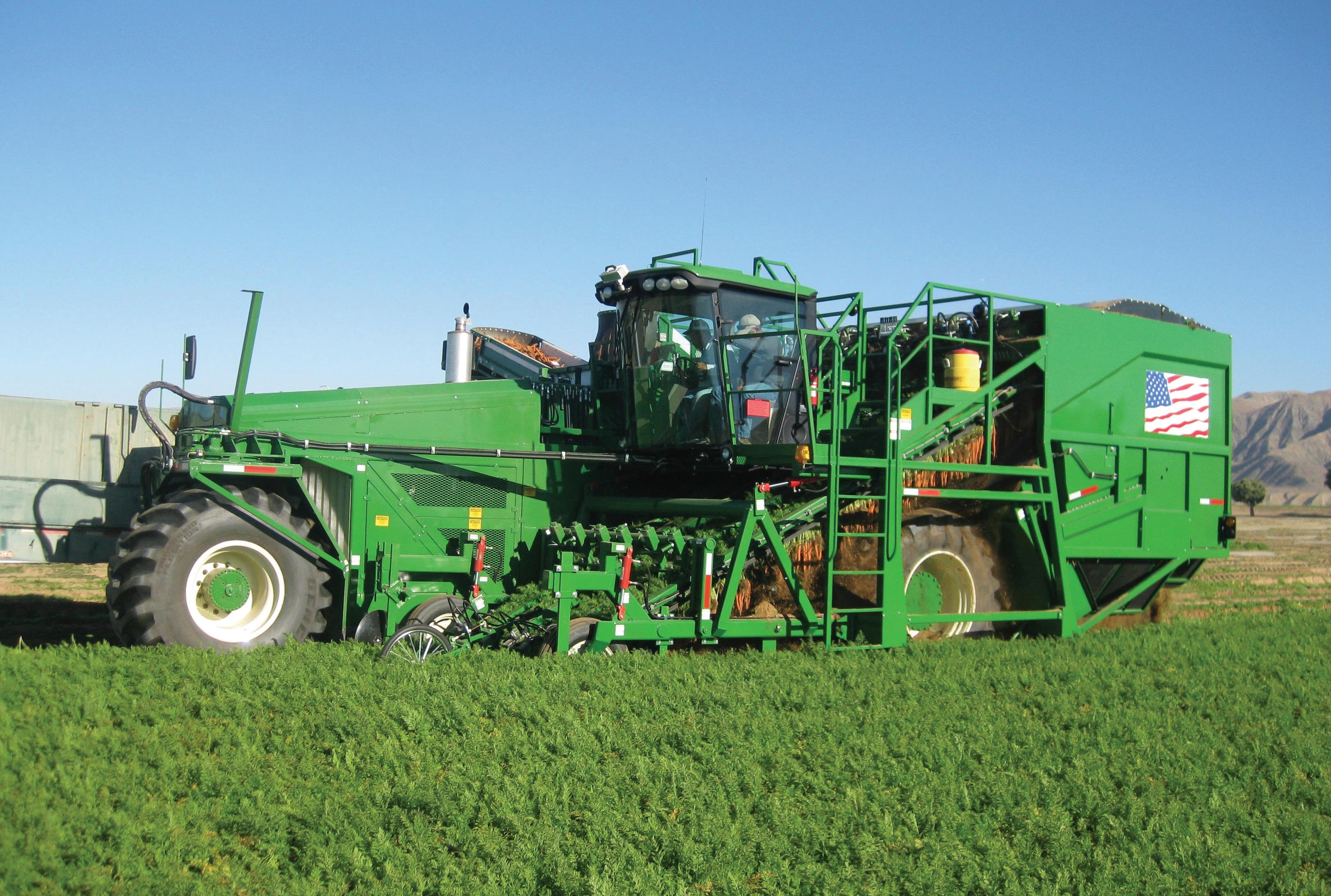


Vol. 32, No. 4




Vol. 32, No. 4
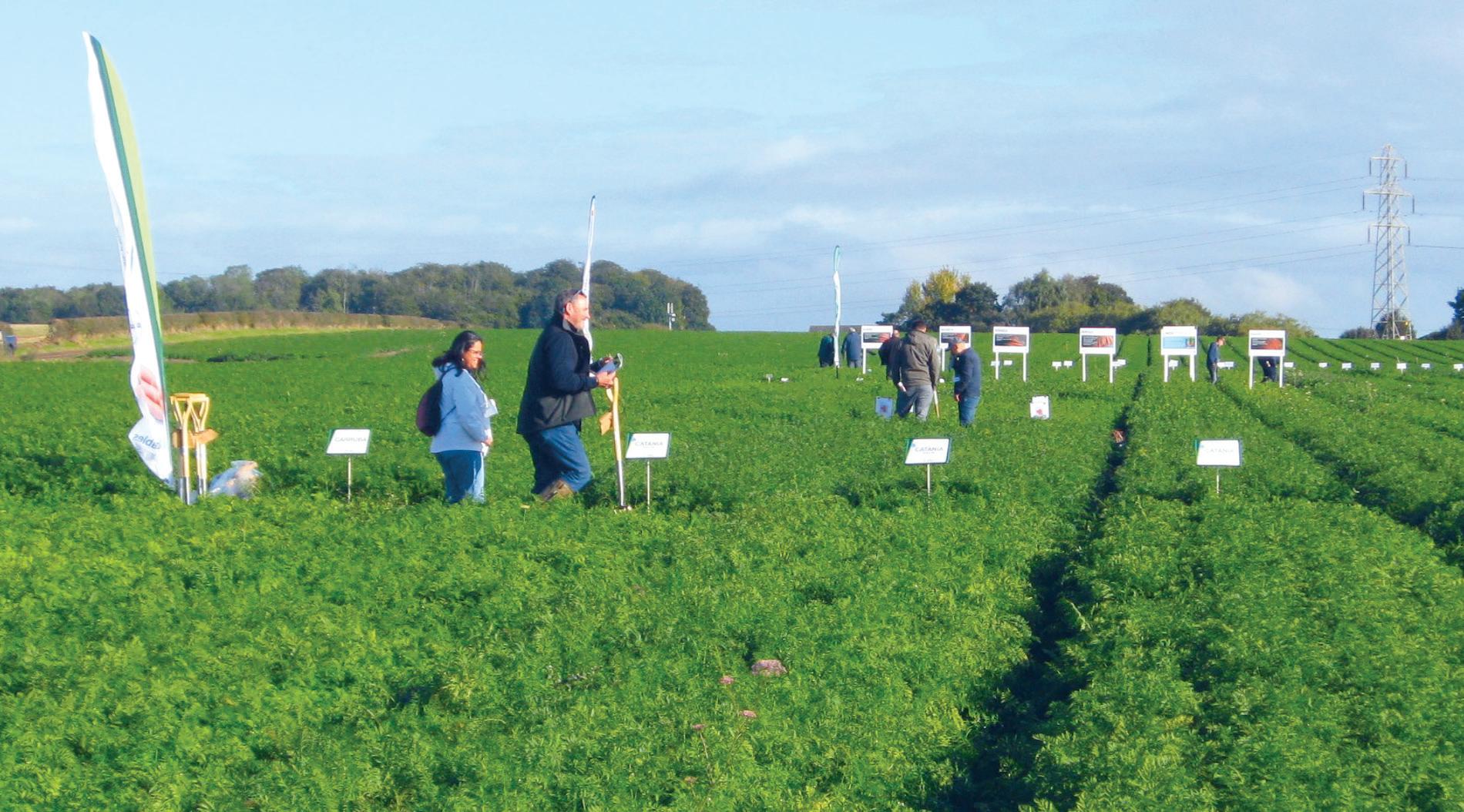
A mid-October field trial at the University of WisconsinMadison provided researchers an opportunity to evaluate carrots for several traits. Read about this trial on page 4, and see how carrots fared in a California field trial on page 6.
Photo courtesy Kevser Ozel, University of Wisconsin
PO
Telephone: (208) 520-6461
Circulation: (503) 724-3581
CarrotCountry.com
CArrOT COUNTrY CONTACTs
Editor Denise Keller editor@ColumbiaMediaGroup.com
Publisher / Advertising Manager
Dave Alexander dave@ColumbiaMediaGroup.com
director of Operations
Brian Feist brian@ColumbiaMediaGroup.com
EdITOrIAL INFOrMATION
Carrot Country is interested in newsworthy material related to carrot production and marketing. Contributions from all segments of the industry are welcome. Submit news releases, new product submissions, stories and photos via email to: editor@ColumbiaMediaGroup.com, or call (509) 697-9436.
AdVErTIsING sALEs
For information on rates, mechanics, deadlines, list rental, direct mail, inserts or other information, call (208) 520-6461 or email: dave@carrotcountry.net
sUBsCrIPTIONs
U.S. $20 per year
Canada $30 per year
Foreign $45 per year
subscribe online at: www.CarrotCountry.com/subscribe or call (503) 724-3581
Email address changes/corrections to brian@ColumbiaMediaGroup.com or mail to:
Carrot Country PO Box 333 Roberts, ID 83444
Carrot Country magazine (ISSN 1071-6653), is published four times a year and mailed under a standard rate mailing permit at Idaho Falls, Idaho and at additional mailing offices. Produced by Columbia Media Group PO Box 333, roberts, Id, 83444
Copyright 2024. All rights reserved. No part of this publication may be reproduced or transmitted in any form or by any means, electronic or mechanical, for any purpose without the express written permission of Columbia Media Group.



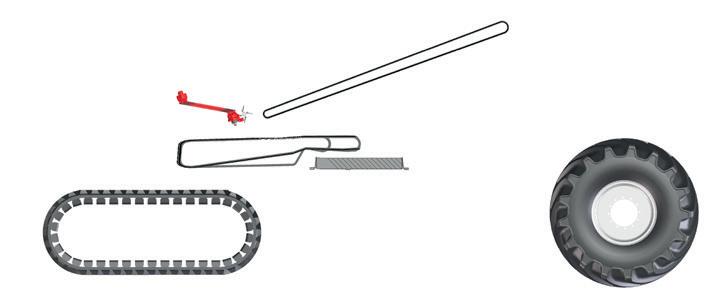





www.dewulfgroup.com

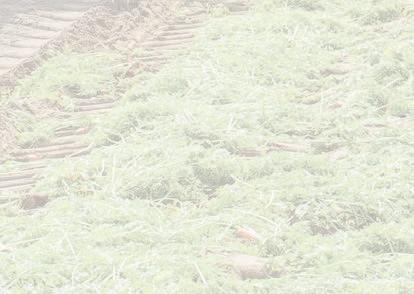



Photos courtesy Kevser Ozel, University of Wisconsin
Afield trial in Wisconsin provided researchers an opportunity to evaluate carrots for several traits. The trial featured 440 carrot entries, including entries from the USDA Simon Vegetable Breeding Program and USDA National Plant Germplasm collection. Additionally, the trial included a hybrid study of baby, cello and novelty carrot types. Carrots were displayed and evaluated for visual characteristics at the University of Wisconsin-Madison on Oct. 17.
With high Alternaria leaf blight pressure at the site of this annual trial, carrots were tested for the disease in an attempt to determine which carrots are more resistant to Alternaria. According to University of Wisconsin graduate research assistant Kevser Ozel, the fungal disease typically causes brown/black necrotic lesions on leaves and weakens carrot tops, which often break during mechanical harvest, which then leads to yield losses.


Participants evaluate carrots for visual characteristics at the University of Wisconsin-Madison.
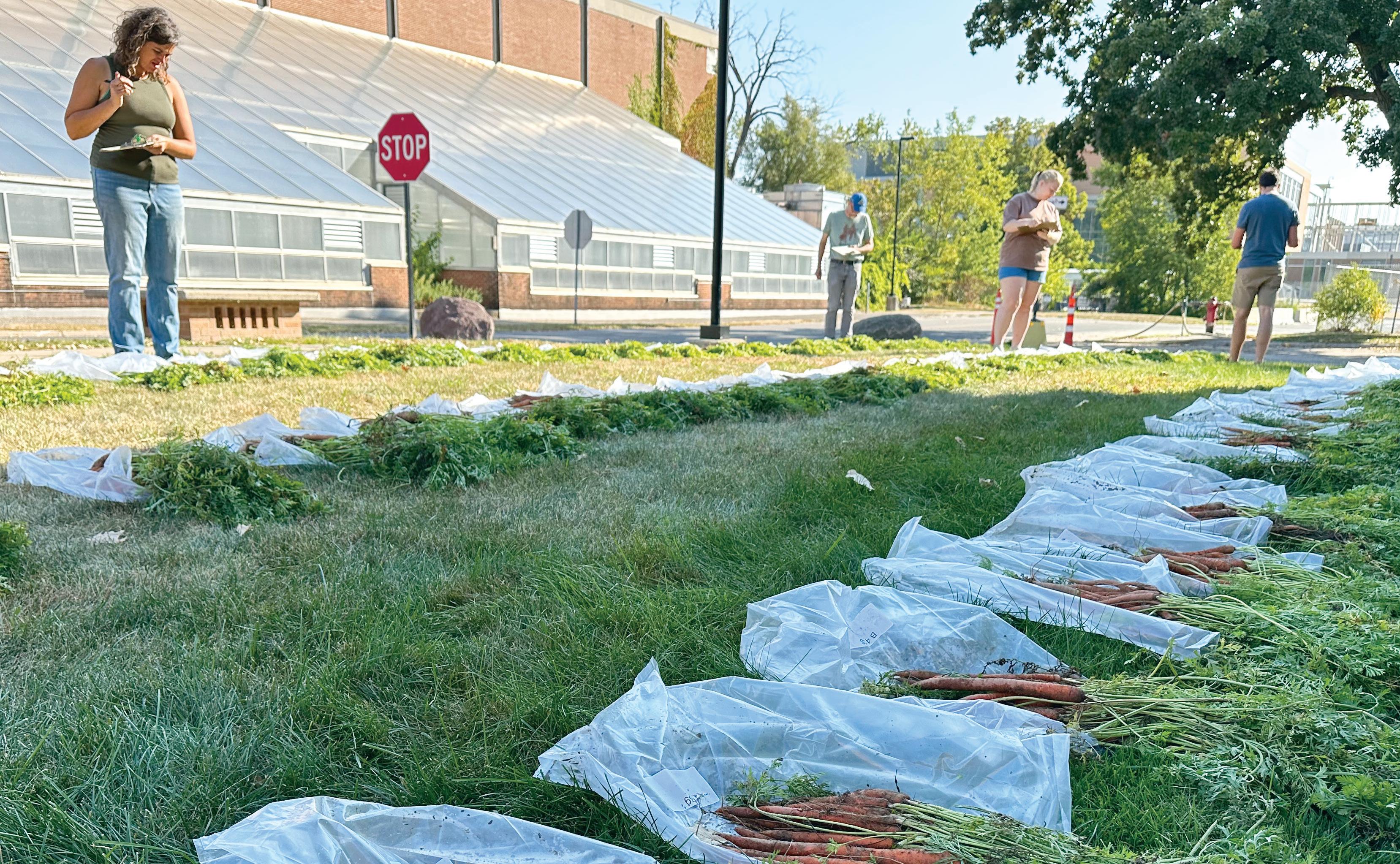


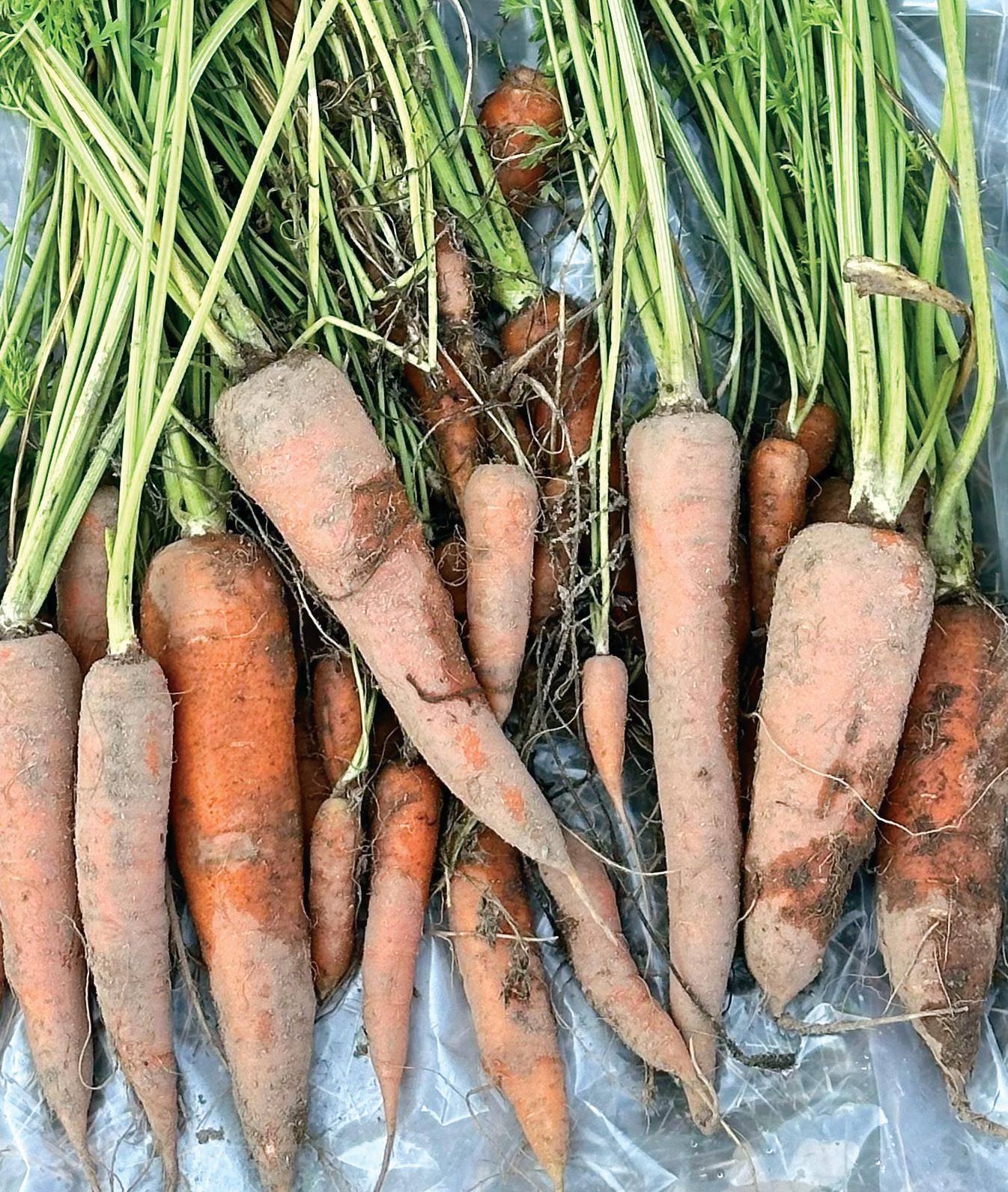

Photos courtesy Kevser Ozel, University of Wisconsin
Carrots’ resistance to nematodes was put to the test in California this summer, as researchers conducted an annual field trial that has been ongoing for more than two decades. The trial is part of the “Exploring and characterizing root-knot nematode resistance in carrot” research collaboration between Phil Simon with USDA and Phil Roberts with the University of CaliforniaRiverside.
According to Kevser Ozel, a University of Wisconsin graduate research assistant, the goal of the trial is to evaluate large collections of carrot genotypes from the USDA Simon Vegetable Breeding Program, germplasm from the USDA National Plant Germplasm collection and entries from various seed companies for resistance to what is typically the most challenging tropical root-knot nematode, Meloidogyne incognita. However, for the first time in the recent history of this series of field trials, this year’s trial included a second tropical rootknot nematode, Meloidogyne javanica
This year’s trial was conducted on a nematode-infested field at the University of California-Riverside Coachella Valley Agricultural Research Station. A total of 460 entries were tested in the M. incognita trial, and 200 entries were included in the M. javanica trial. The entries included inbreds, hybrids, mapping populations from the USDA Simon Vegetable Breeding Program and genotypes from the seed industry.
The trial was significantly challenged by high temperatures of over 95 degrees Fahrenheit, nutsedge weed and insects (possibly garden webworms), which reduced carrot stand counts in the trial, according to Ozel.
Representatives from various segments of the carrot industry including universities, non-profit agencies and the seed industry attended the trial’s harvest display in late August.

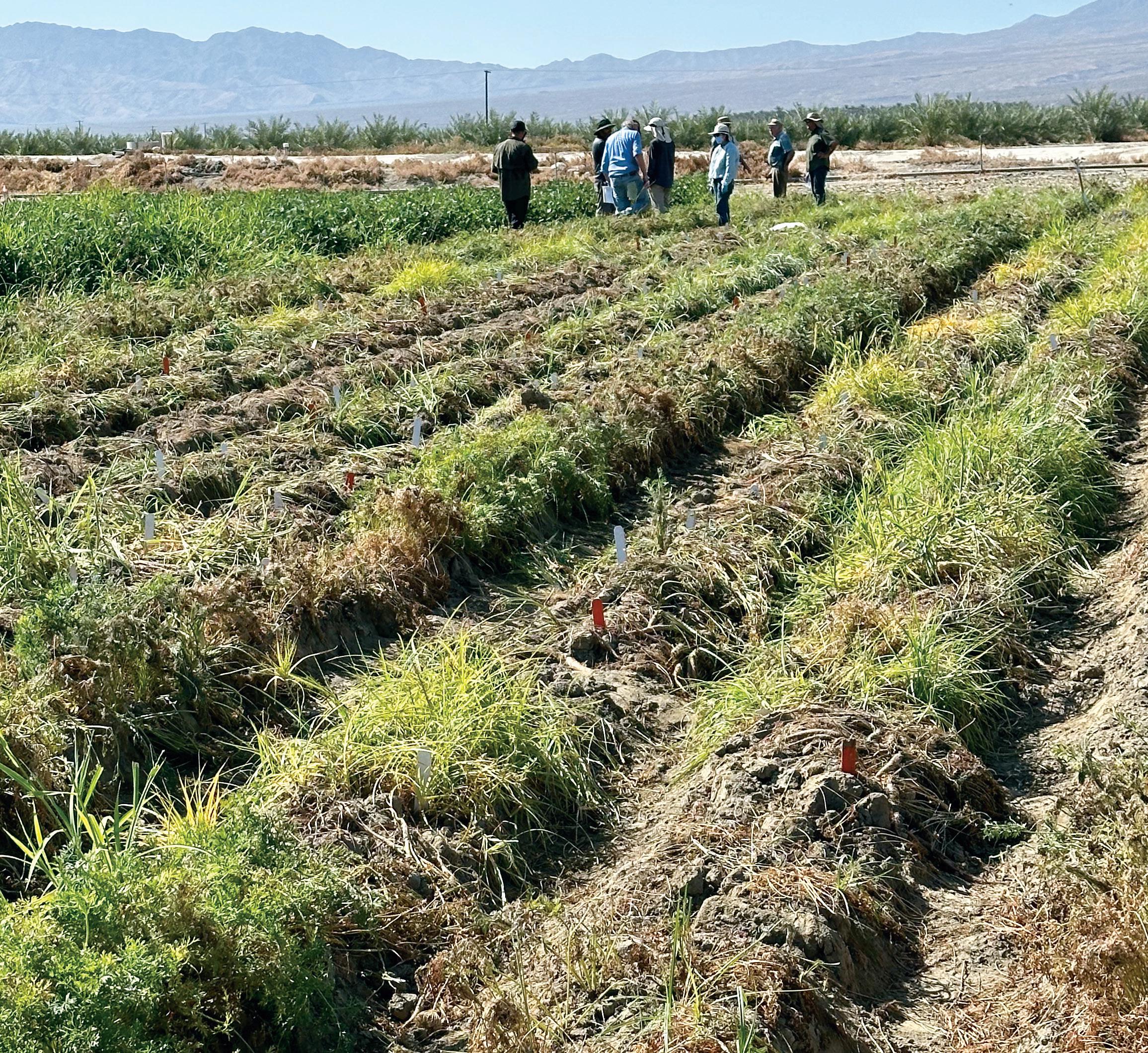

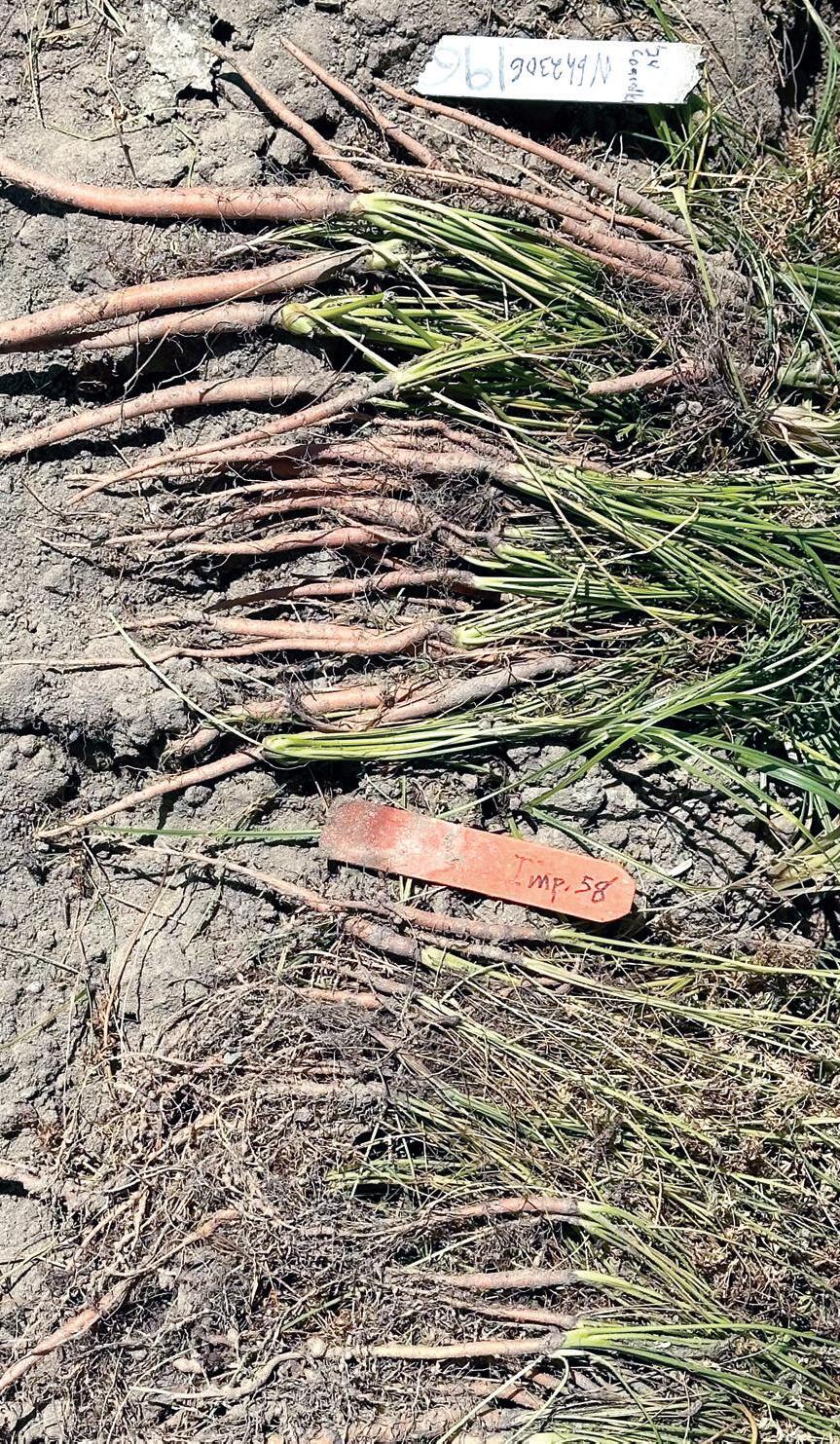
By Philipp Simon, USDA-ARS
The USDA releases crop germplasm for use by plant breeders and other researchers. Recent germplasm releases from the USDA carrot breeding program include carrot inbreds L1408, L2575, L7553 and L9793. These carrot lines are released to provide germplasm for developing improved genotypes and long Imperator hybrids for cut-and-peel or “baby” carrot production.
Beginning with Apopka, an openpollinated long carrot that the USDA carrot breeding program released in 1985, intercrosses were made with several USDA inbreds. With the emergence of the cut-and-peel or “baby” carrot market in the 1990s, longer-rooted selections from these crosses with mild, sweet flavor and dark orange color were made for 10-12 cycles of selection. The cut-and-peel or “baby” carrots widely sold in the U.S. are hybrids, so carrot breeders made experimental hybrids with these four inbreds.
They were grown in field trials for five to six years to determine how well they perform, as they were evaluated by 35-50 carrot growers and seed industry personnel. These experimental hybrids performed well in comparison to widely grown commercial cultivars. Based on this, USDA released these four carrots so vegetable breeders can use them in developing hybrids in their breeding programs and researchers can use them in studies.


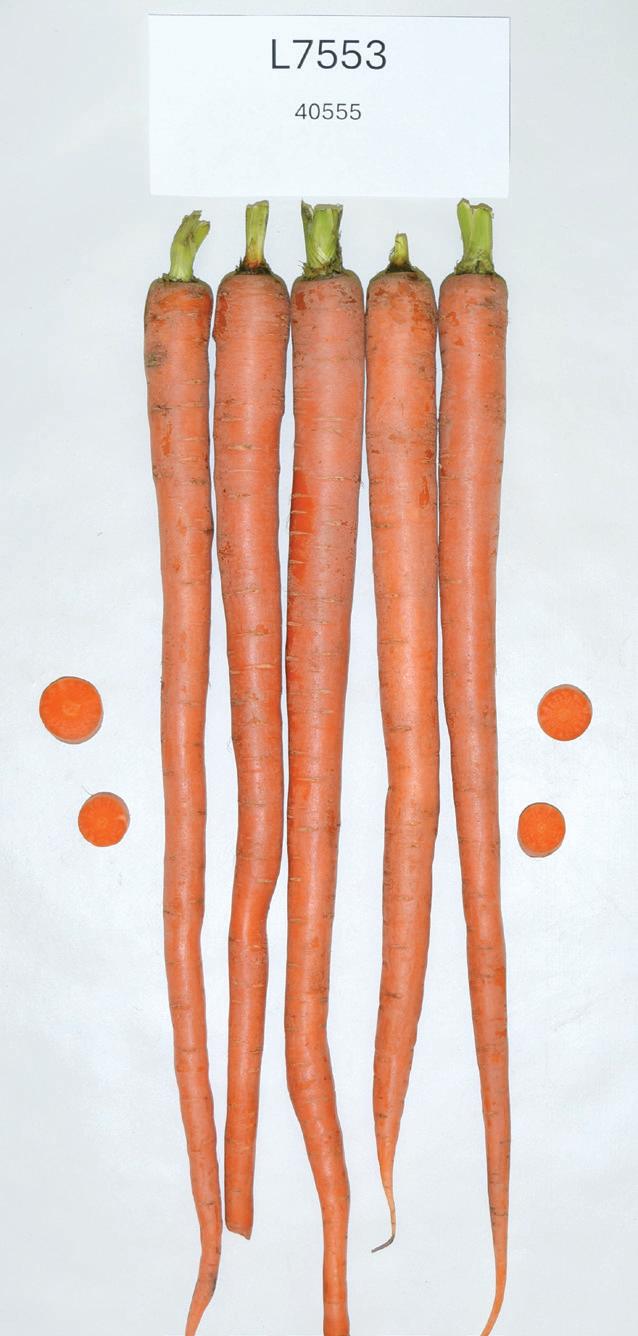



1200 Anderson Corner Rd.
Parma, ID 83660
(800) 733-9505
www.nunhemsusa.com paul.bender@basf.com
KingCut, a new variety from BASF/ Nunhems, is a highly adaptable slender carrot for cut-and-peel processing. This variety boasts a high percentage of cuts measuring 0-7/8 inch, ensuring optimal processing efficiency. Its foliar resistance and vigor make it an excellent option for both organic and conventional production. With durable roots that are less prone to cracking and good resistance to Alternaria dauci and powdery mildew, KingCut offers quality and high yield potential for growers.
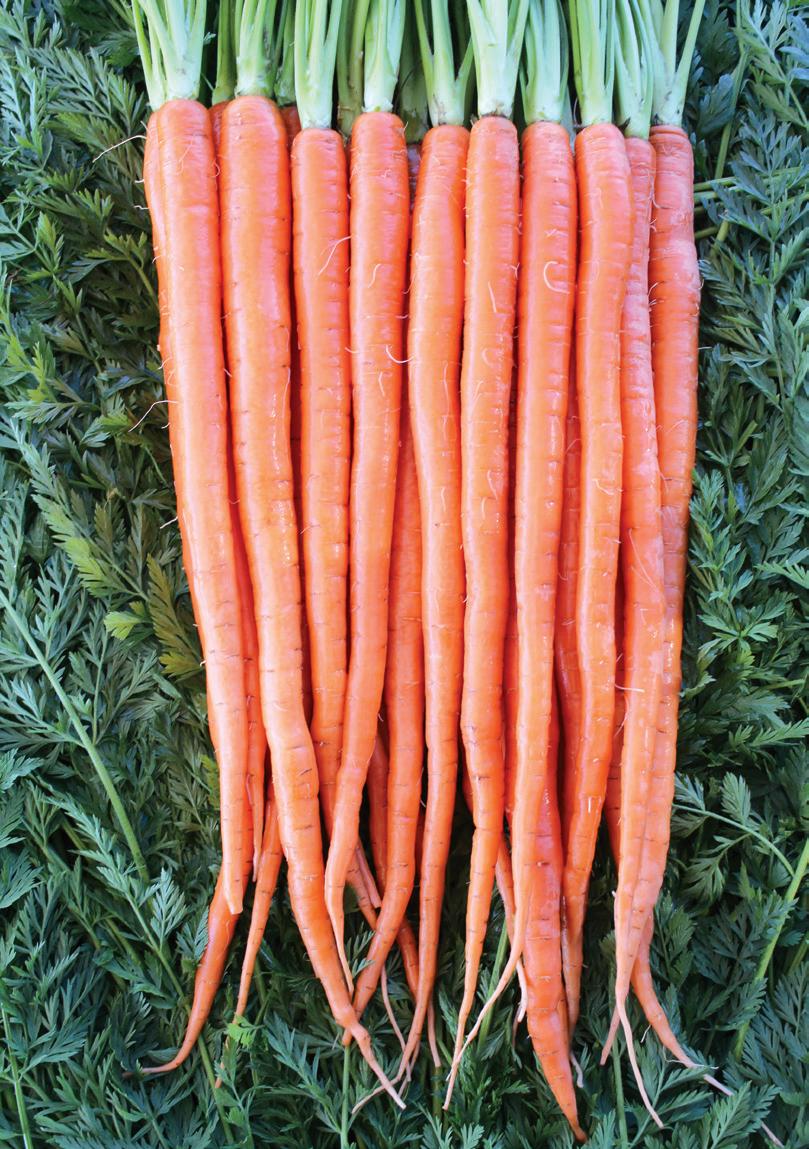

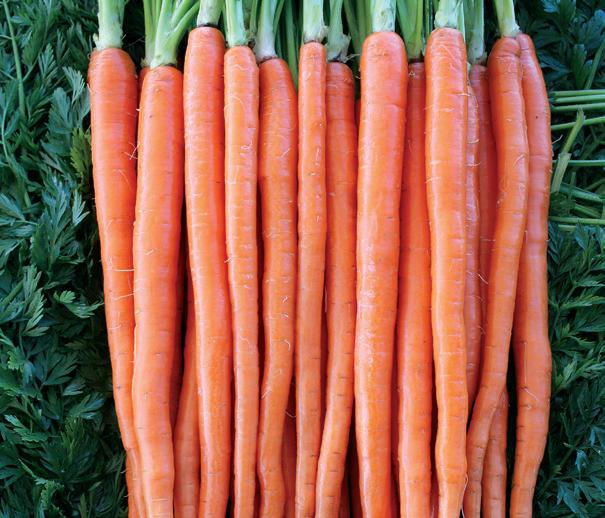
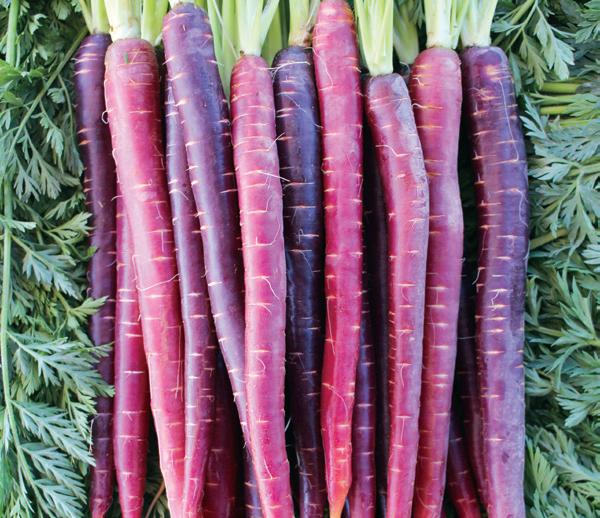
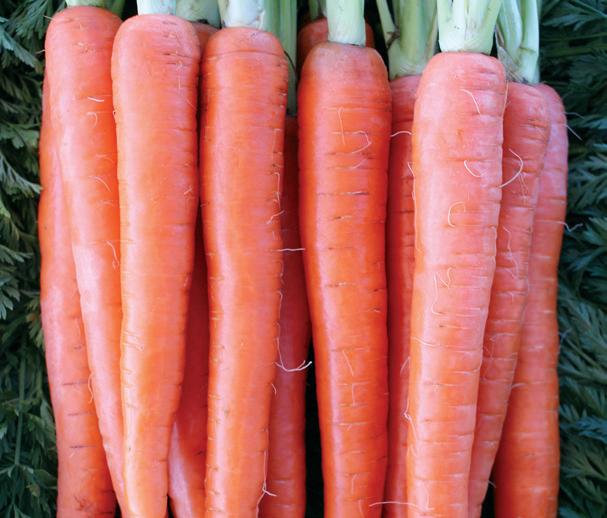
A market standard for fresh whole carrots, Maverick offers exceptional adaptability and consistency with slightly tapered, long roots with good fill. The variety is normal maturing with a high percentage of cellos; root quality makes the product useful for other applications. The variety is popular for commercial organic production and produces consistent, excellent flavor, smooth skin and very good interior color.
ReadyCut is an excellent option for cutand-peel processing. With a uniform, long, slender root shape for cuts of all diameter profiles, this variety features a high percentage of premium pieces under 5/8-inch diameter. Carrots have good flavor, crunchy texture and durable roots for a lower percentage of cracking and breaking.
PurpleSummer offers a purple exterior complemented by a small yellow-orange core. This carrot offers a crisp texture and exceptional eating quality. With improvements in bolting during the spring and summer harvest windows, this variety ensures a reliable yield potential. Its dual purpose nature makes it ideal for fresh market, bunching and processing, providing versatility for growers.
TrophyPak is an early-maturing and vigorous cello/jumbo hybrid with exceptional adaptability and consistency. The variety produces a high percentage of cellos while also flexible for use in making jumbos. Carrots feature vigorous and upright foliage, high tolerance to Alternaria dauci and powdery mildew, and tapered roots with excellent tip fill.

1972 Silver Spur Place Oceano, CA 93445 (805) 473-2199 bejoseeds.com info@bejoseeds.com


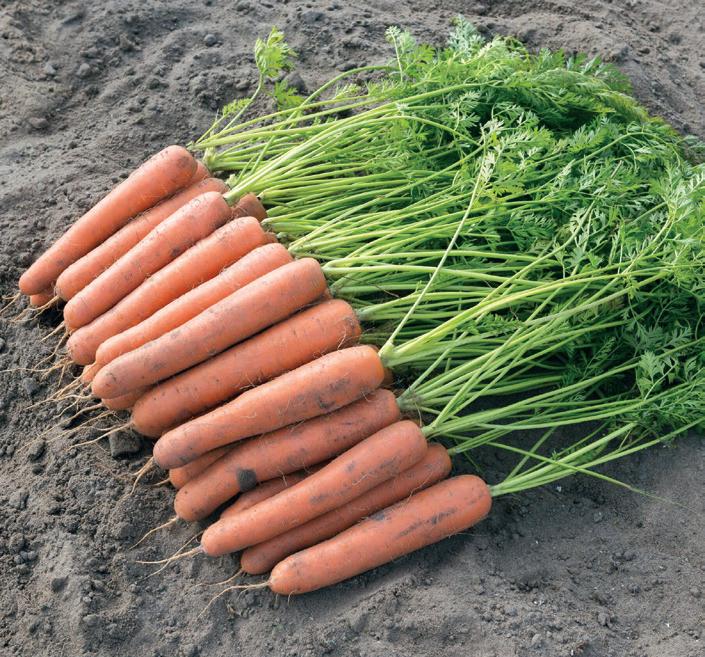


Set to become commercial soon, Ellis is a Nantes-type hybrid for fresh market and suitable for long storage. This variety needs 120-140 growing days for full blunt length. The variety is strong against breakage and splitting and has strong foliage for mechanical harvest, stress and disease pressure. High carotene and Brix value are maintained through storage.
Set to become commercial soon, Hestan is a Nantes-type hybrid for fresh market and suitable for long storage. The variety takes 130-150 growing days for full blunt length. Strong against breakage and splitting, this variety is a very uniform and good yielder with strong foliage for mechanical harvest, stress and disease pressure. High carotene and Brix value are maintained through storage.
Junction is a widely accepted Imperator with straight and slightly tapered roots, dark orange color and no green shoulder.
Naval is a continental Nantes type with a mid-late relative maturity. Naval can be used for bunching and fresh market sales as well as a long-term storage. It has strong tops, very uniform and excellent flavor and is crack resistant. This grower favorite is also available in organic seed.
Narvik is an early cylindrical Nantes for bunching. The variety produces smooth roots with excellent taste and storage, paired with strong and upright tops. It is also available in organic seed.

701A LaGuardia St. Salinas, CA 93905 (831) 455-3000
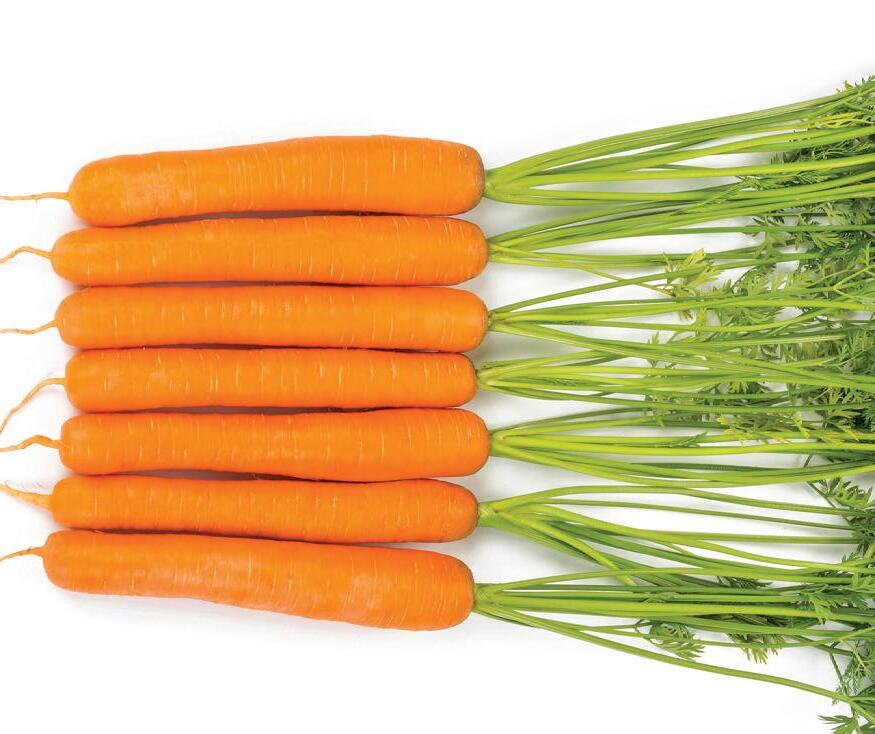
New in 2021, Ymer is a Berlicum/Nantes-type hybrid for fresh market and suitable for long storage. Reaching maturity in 130 growing days, the variety features strong, dark green foliage, and a nice cylindrical shape, growing to 8 inches. High carotene and Brix value are maintained through storage.

(800) 962-4999
www.stokeseeds.com
customerservice.us@stokeseeds.com
SV4128 is an Imperator type with 66-day maturity. Grown for slicer and cello use, carrots are smooth with tubular shape and 10to 12-inch roots. Strong tops make for easy mechanical harvest.
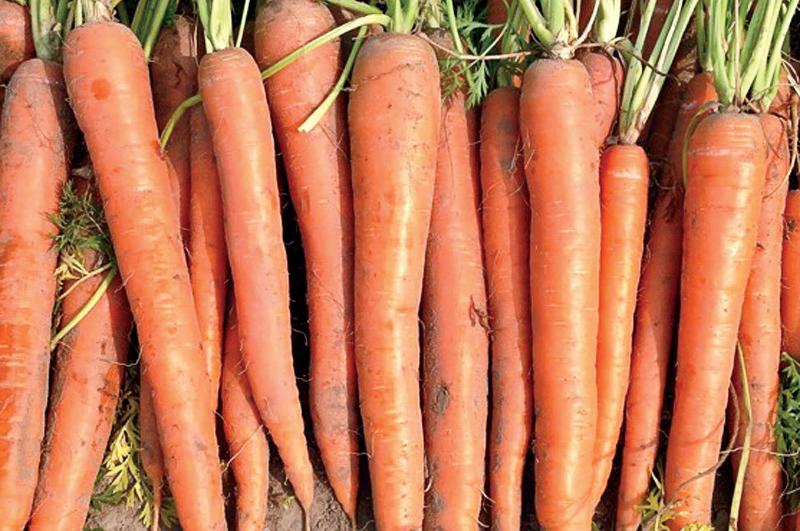
Orange Blaze is a 70-day maturity Imperator type for cello and jumbo use. Carrots have dark orange color, cylindrical shape, vigorous roots 9-10 inches in length. Adapted to mineral and muck soils, the variety offers high yield potential and easy harvesting.
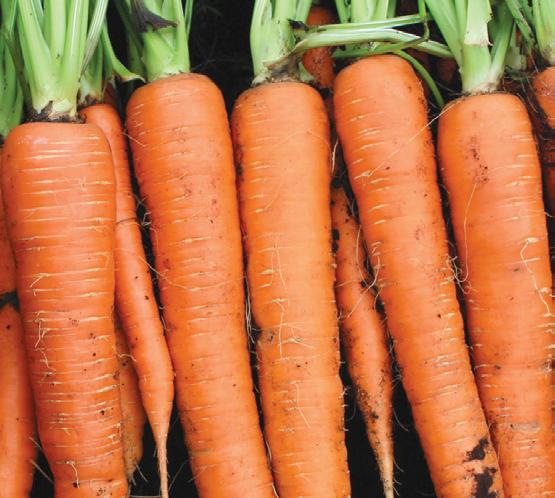
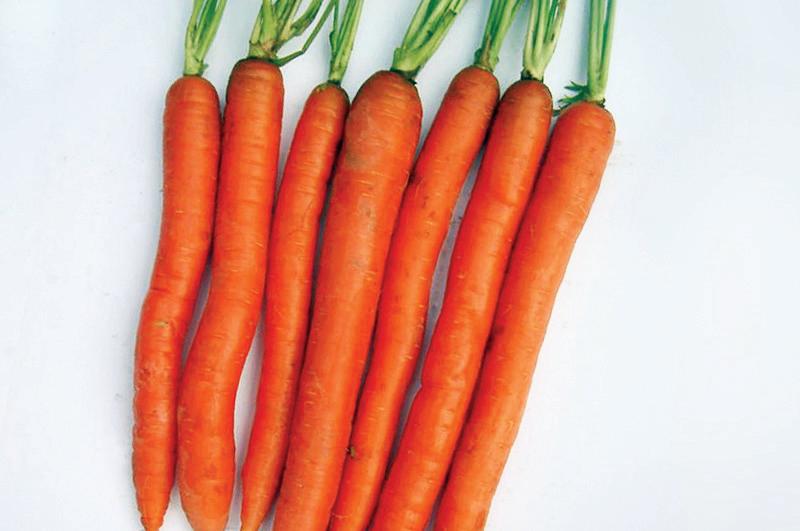
SV2348 is a 68-day maturity Imperator type with 12-inch length, dark orange color, blunt tips, small cores and strong top attachment. The variety is well suited for slicer and cello use and works well on mineral and muck soils.

Caravel is a mid-season maturing hybrid Nantes type with cylindrical shape, 10-11 inches in length with a slight taper and blunt tip. With attractive skin color and strong top attachment, the variety is well suited to fresh market and processing usage.
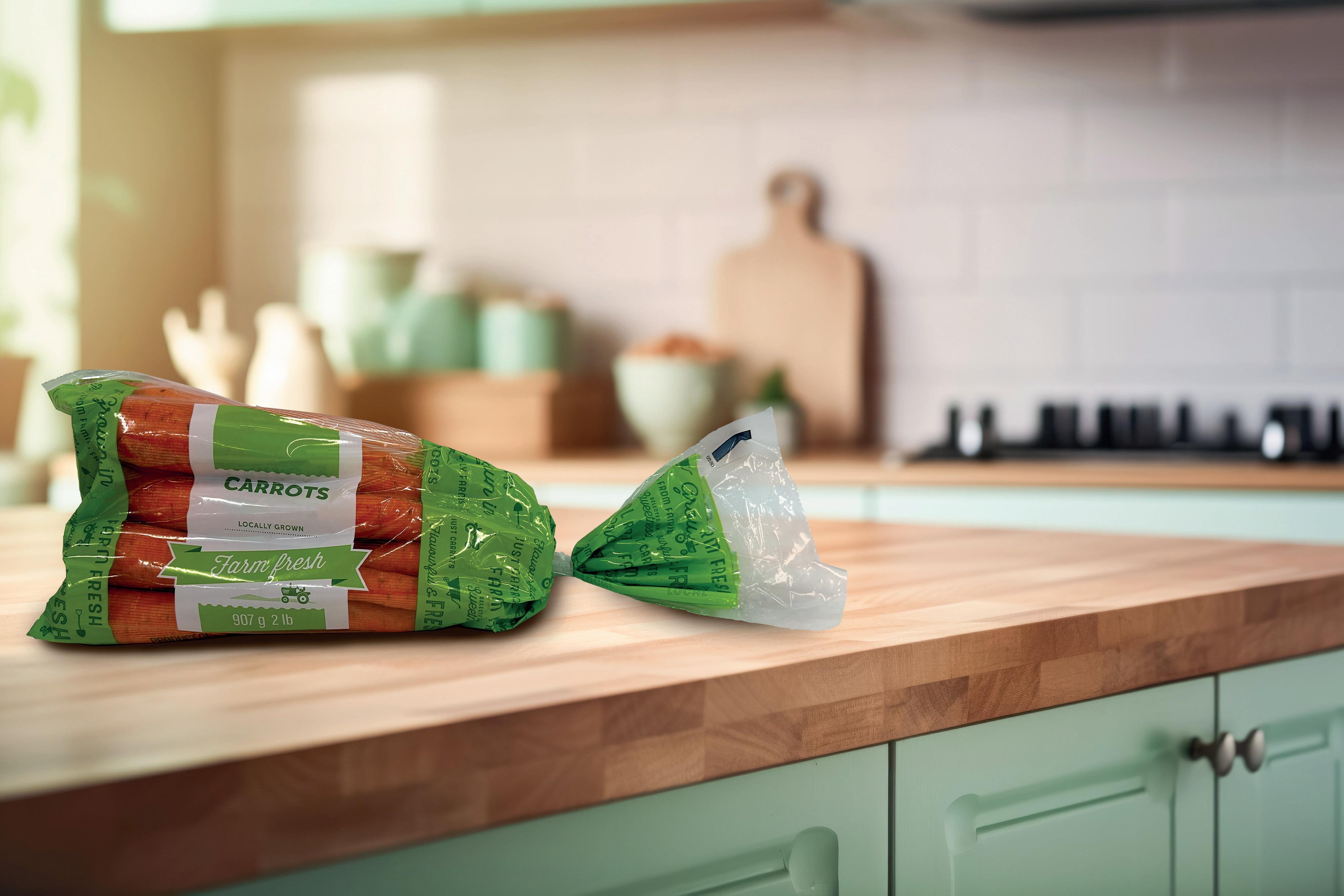

(831) 771-1500
www.vilmorinmikado.us.com
With maturity at 120 days from sowing, Siroco produces uniform fruit suited well for slicing and cello Nantes markets. Strong tops hold well late into the harvest season, standing up to disease and weather alike.


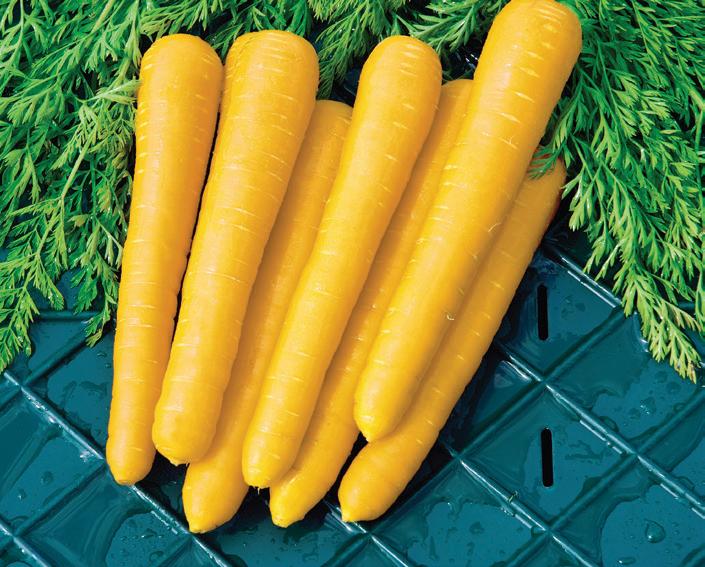
Bolero has been a global industry standard for more than 30 years.

Musico is a remarkably uniform early Nantes variety. Its cylindrical roots provide high and early yields. Resistance to bolting, Alternaria and powdery mildew make it a very versatile option. Smoothness and color are two main advantages of this variety well suited for organic production.
Leicester
Great Lakes Fruit, Vegetable and Farm Market Expo DeVos Place Conference Center Grand Rapids, Mich. www.glexpo.com
Editor’s note: To have your event listed, please email Denise Keller at editor@ columbiamediagroup.com. Please send your information 90 days in advance.
This main-season yellow Nantes variety hits maturity 120-130 days from sowing and yields beautiful, smooth roots with excellent flavor.
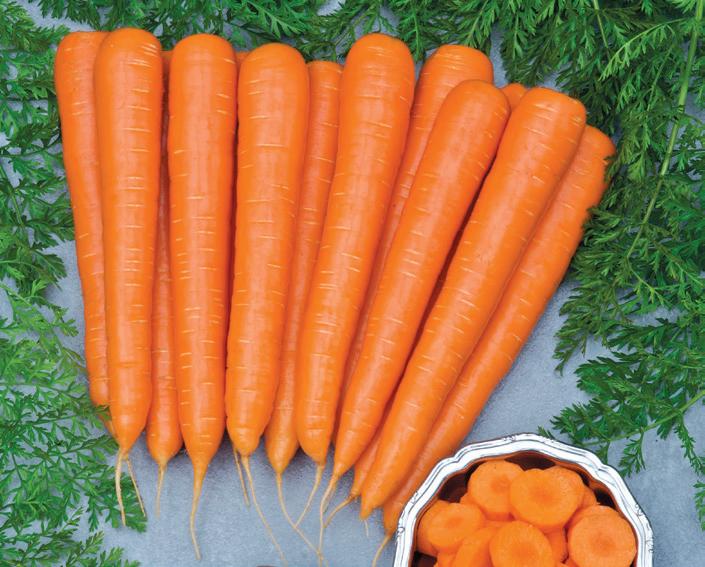
A workhorse for the processing and storage market in North America, Volcano makes late harvests more reliable with high marketable yields paired with great storage capacity.
Story and photos by John Stolarczyk, World Carrot Museum
The British Carrot Growers Association (BCGA) held its annual carrot field trials event on Oct. 3 in central England in Nottinghamshire – Robin Hood Country. The demonstration day allowed attendees to explore more than 80 plots over several acres, featuring both existing and emerging carrot varieties, as well as gain insights into the latest breeding advancements and the diversity within the UK carrot industry.
An indoor exhibition area provided opportunities for networking and engagement with industry professionals. Over 20 of the major players in the UK carrot industry brought trade exhibits to the event. These included seed suppliers, agronomy experts, machinery manufacturers and storage solutions.
In addition, seven seed companies entered orange varieties in a taste testing event, in which BASF earned the best in show award for its variety Romance F1.
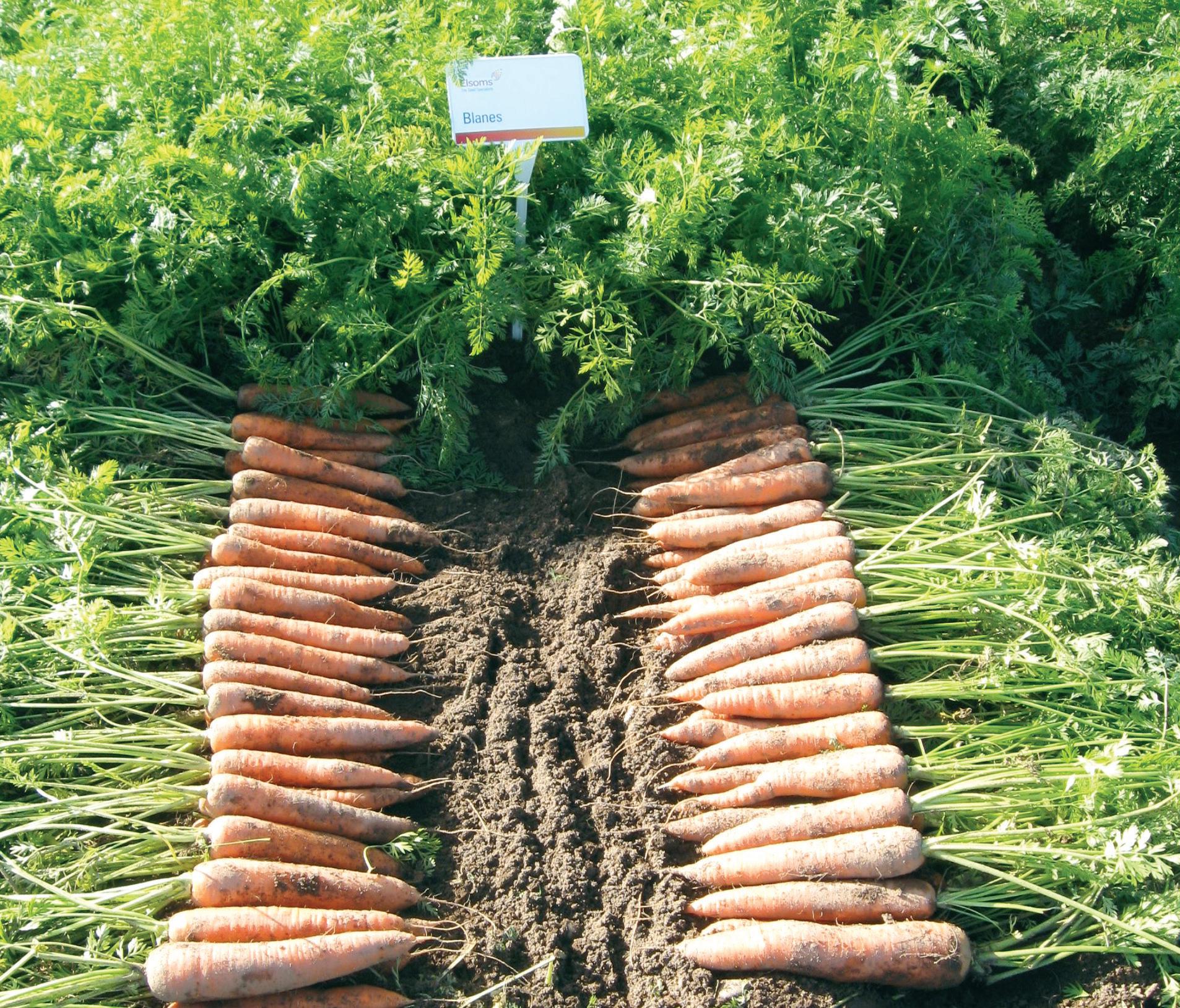
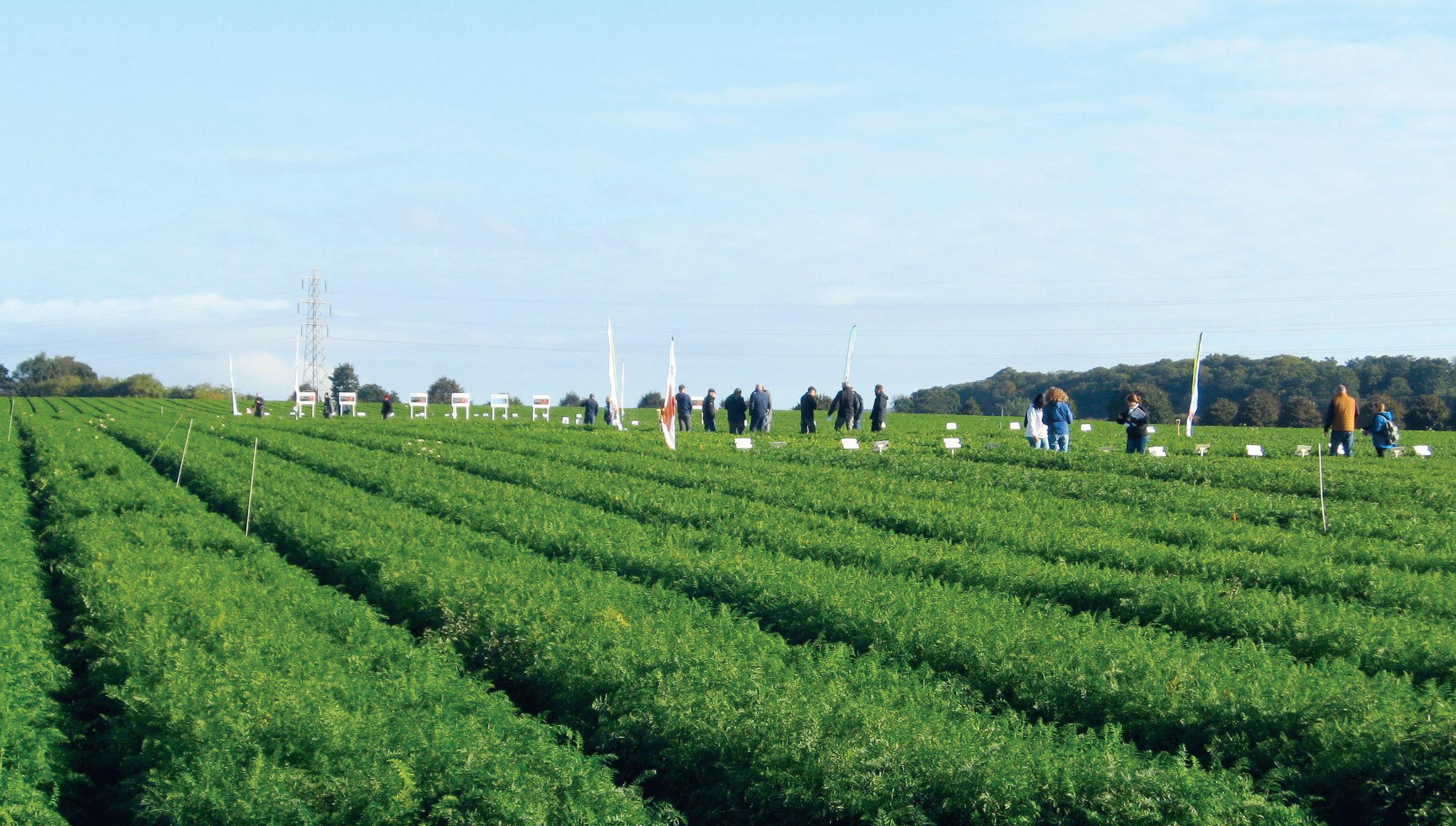
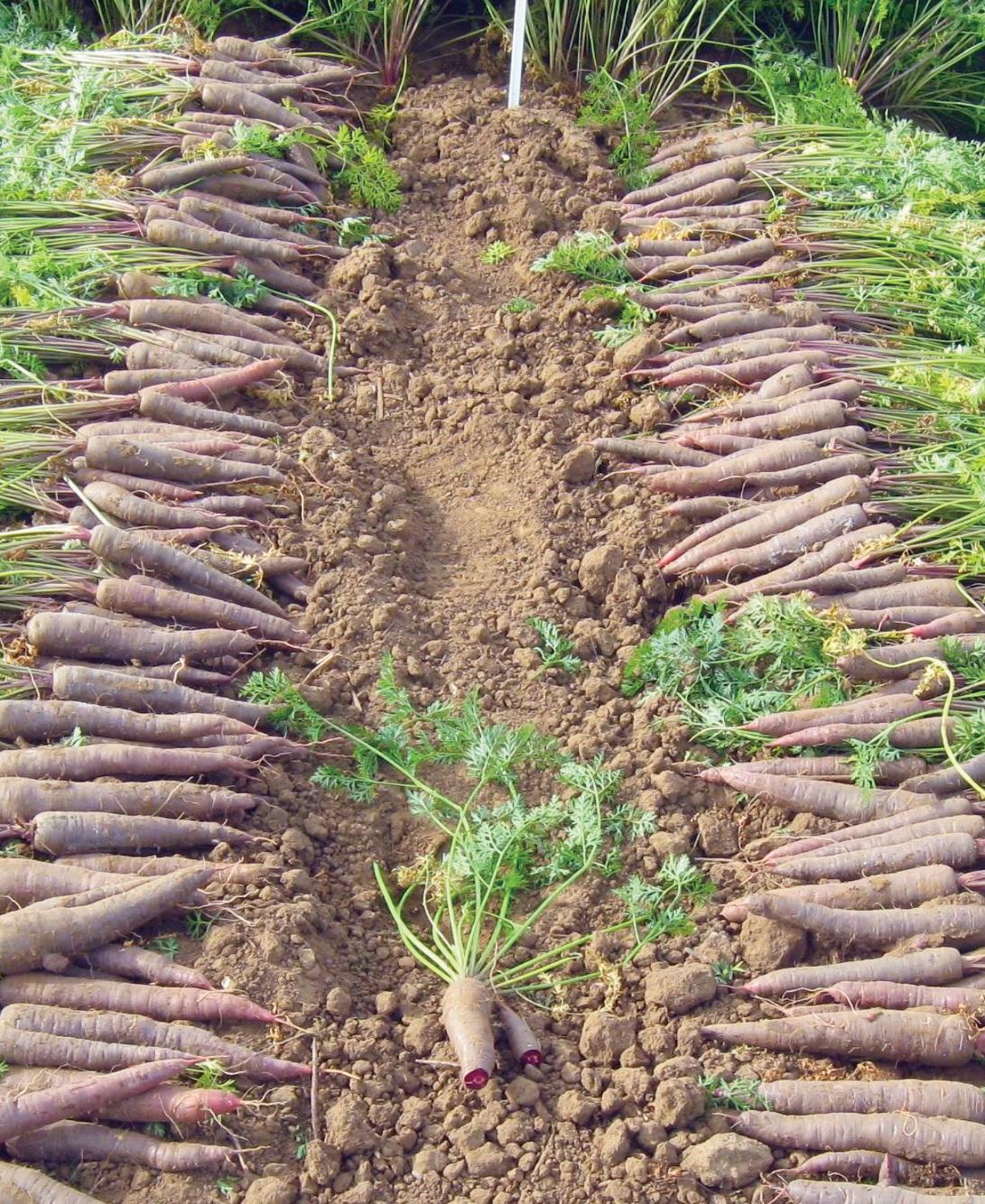


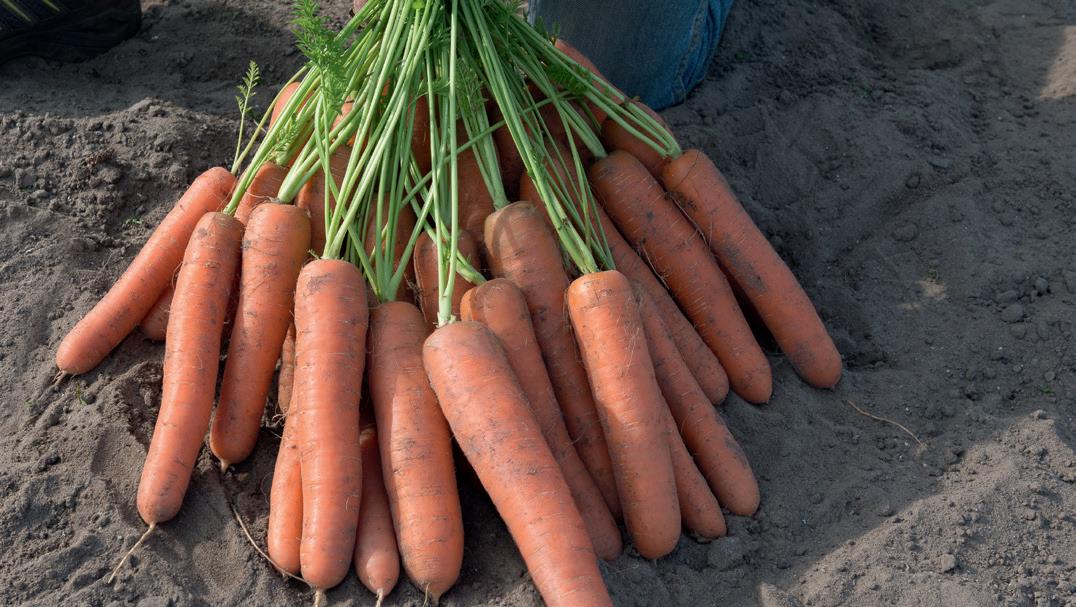
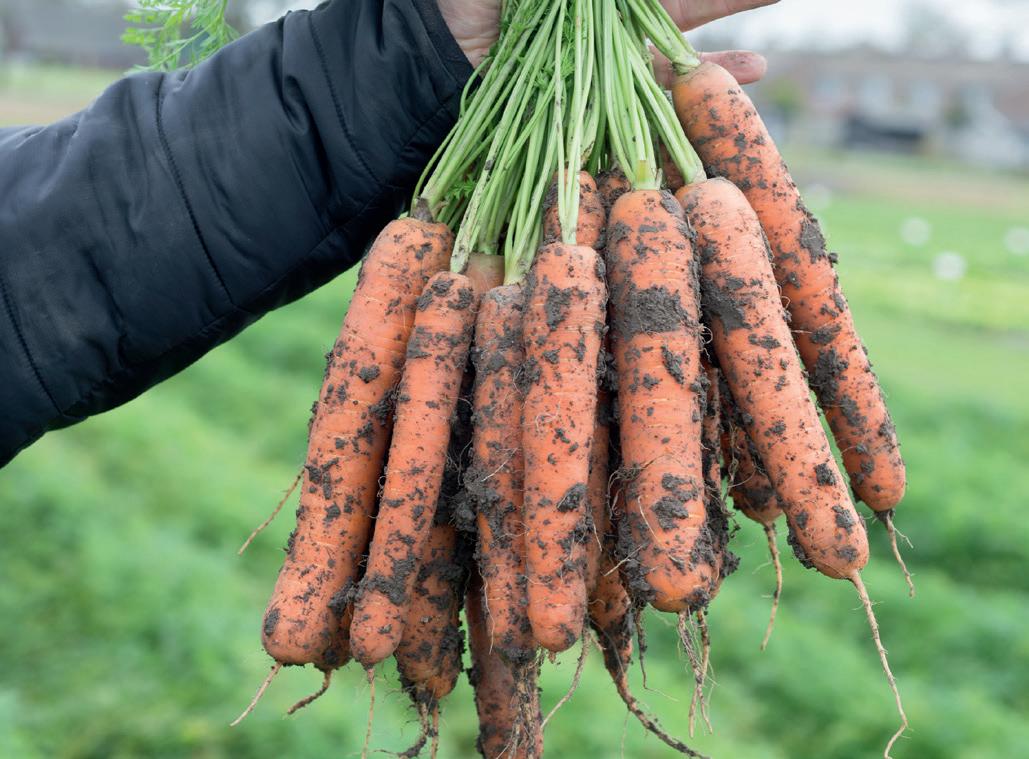
Very full-sized Nantes with strong dark green tops and cylindrical, smooth blunt roots. A specialized variety with a sweet taste when sown in fall for winter harvest.
Resistance IR: Ar / Cc / Ps, Pv
f bejoseeds.com Exploring nature never stops
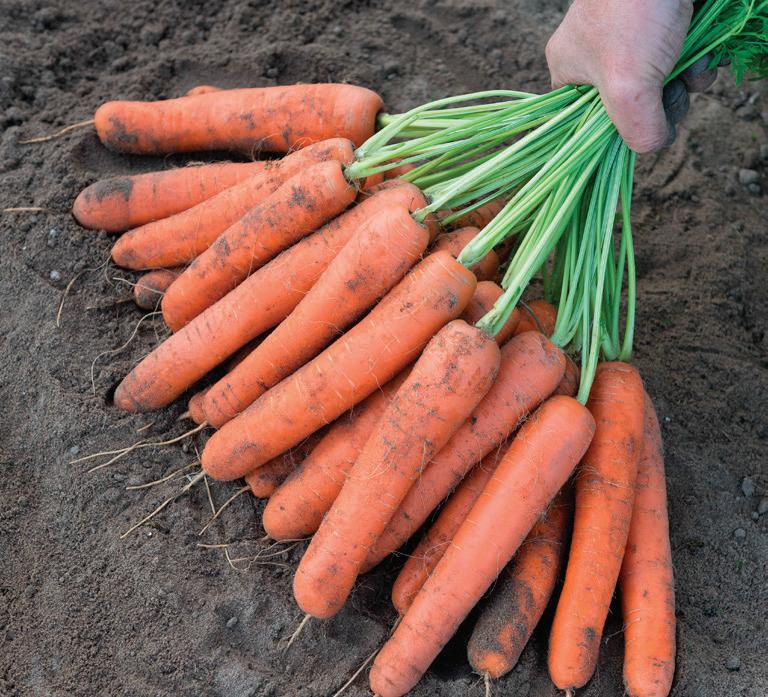
Similar to Nelson, with more uniform roots and plant vigor. The 5 1/2–6 1/2” roots have mild flavor and crisp, juicy texture with early sugar development. Strong, compact tops for bunching.
Resistance IR: Ar / Cc / Ps, Pv
f Chelsey Lenczyk - Organic Lead, Home & Farm Market Manager f T: 267-838-0078 E: c.lenczyk@bejoseeds.com
A Nantes type that produces very shapely, uniform, hairless roots 7-9 inches long. Crisp and sweet, Naval resists cracking with an added bonus of a long shelf life.
Resistance IR: Ad / Ar / Cc

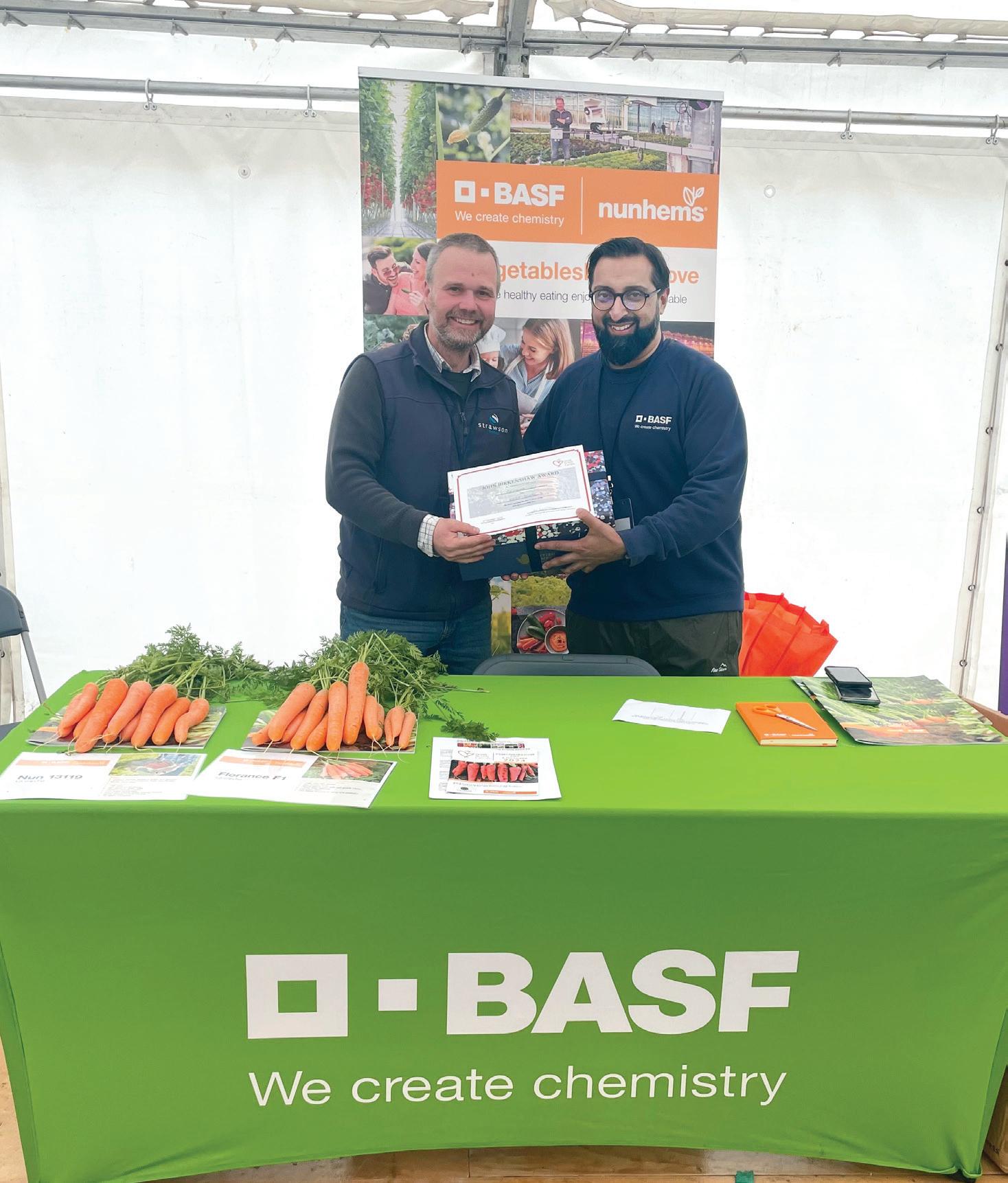
This year’s event coincided with the inaugural National Carrot Awareness Day. This is a new initiative instigated by the BCGA to celebrate the UK carrot growing crop and to encourage people to get creative, eat and cook with carrots. The National Carrot Awareness Day was designed to help explain how important carrots are in maintaining good health and to remind people of the carrot’s affordability and versatility as a vegetable that is good in sweet and savory dishes and equally nutritious whether eaten raw or cooked. People were encouraged to post their favorite carrot dishes on social media using the hashtag #theloveofcarrots.
The day also aimed to raise awareness of the low returns farmers make from growing this high-risk crop and to send a message that boosting consumption of carrots would help support farmers.
The carrot is considered an important British vegetable. In fact, carrots are the nation’s favorite vegetable, with 75 percent of Britons saying they eat carrots regularly and crunch their way through more than 10 billion carrots each year. The BCGA is proud of the fact that, because of the nature and landscape of the British Isles and the widespread location of UK carrot farms, the UK carrot industry is typically 99 percent self-sufficient in carrots. However, weather conditions can impact the UK’s ability to produce carrots, resulting in a few weeks of the year in which carrots might have to be imported.


Vive Crop Protection has made several key leadership changes, bringing on board two new employees and promoting a pair from within.
The company has hired Lana Green as national account manager. Green has a background in agricultural sales and distribution at companies including FMC and Syngenta. She will lead Vive’s distribution network in the United States and develop and execute distribution strategies and large account management plans.
Steve Eskelsen has joined the company as northern technical sales agronomist, bringing a Ph.D. in horticulture crop science and pest management, as well as agronomic expertise and technical support experience. He will lead field trials and oversee agronomic recommendations, data generation and training.
In addition, Jonathan Adamson has been promoted to regional account manager, while Greg Esco, previously the eastern U.S. sales manager, has been promoted to U.S. sales leader.
JH Biotech, Inc. has launched the International Prevention Agriculture Institute (IPAI). The nonprofit organization aims to raise global awareness of land degradation, advocate for sustainable agricultural development, and ensure longterm food security by fostering a healthier ecosystem.
“Prevention before correction” is the cornerstone of the IPAI philosophy. Through research, field trials, and partnerships with universities and other companies, the IPAI plans to develop and deliver best practices, including programs for integrated crop management, integrated pest management and integrated health management.


Jerada RZ Delivers
Jerada RZ is an early Nantes hybrid for fresh cello, processing and bunching. Jerada RZ has an average of 90 growing days to reach full blunt shape and offers great uniformity, foliage health and taste. This early variety is high yielding and has long field standability.
• Early high yielding variety
• High uniformity in roots
• Strong, mid-dark green and upright foliage
• Smooth skin
• Excellent for bunching and fresh markets
www.rijkzwaanusa.com
